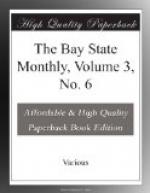* * * * *
There is need of a more careful study of politics on the part of the people of this country. The recent elections in this State and in other States again recalls this need, and have again shown that altogether too many men cast their ballots, not in accordance with their intelligence or with their convictions, but as they are told to cast them. The first duty of an American citizen should be a thorough acquaintance with American political institutions, their origin, their growth and progress, their utility or their worthlessness. The right of suffrage is one of the inalienable rights of the people. It is one of their most sacred rights also, and ought not to be exercised except under most careful, candid and conscientious conditions.
One cannot suppose, even for a moment, that our people are not aware of the accuracy of these assertions. We are not advocates of property ownership as a qualification of voting, nor would we seek to lay down any arbitrary sine qua non, to be rigidly adhered to in our system of voting. But, is it enough that a man should know how to read and write before he can cast a ballot? Do these qualifications comprise everything that is necessary to a proper and safe exercise of the right of suffrage? If so, then politics can never be formulated as a science, and politicians can never be regarded other than what many of them seem to be,—tricksters trading on the incredulity and ignorance of the masses. It is only when people understand how and why they vote, that they can vote intelligently.




